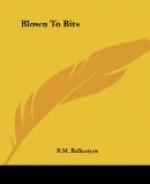“You draw landscape also, I doubt not?”
“Oh yes—plenty. If you come home to me to-night, I will show you some.”
“I shall be only too happy,” returned the youth, sitting down again to his sketch, “and perhaps I may be able to give you a hint or two—especially in reference to perspective—for I’ve had regular training, you know, Kathy, and I dare say you have not had that here.”
“Not what you will think much, perhaps, yet I have study a little in school, and very much from Nature.”
“Well, you have been under the best of masters,” returned Nigel, “if you have studied much from Nature. And who has been your other teacher?”
“A brother of Mr. Ross. I think he must understand very much. He was an engineer, and has explained to me the rules of perspective, and many other things which were at first very hard to understand. But I do see them now.”
“Perhaps then, Kathleen,” said Nigel, in that drawling, absent tone in which artists are apt to indulge when busy at work—“perhaps you may be already too far advanced to require instruction from me.”
“Perhaps—but I think no, for you seems to understand a great deal. But why you call me Kathleen just now?”
“Because I suppose that is your real name—Kathy being the short for it. Is it not so?”
“Well, p’raps it is. I have hear mother Holbein say so once. I like Kathleen best.”
“Then, may I call you Kathleen?”
“If you like.”
At this point both artists had become so engrossed in their occupation that they ceased to converse, and for a considerable time profound silence reigned—at least on their part, though not as regarded others, for every now and then the faint sound of laughter came floating over the tranquil lagoon from that part of the coral strand where Captain Roy was still tickling the fancies and expanding the imaginations and harrowing or soothing the feelings of the Cocos-Keeling juveniles.
Inferior animal life was also in ceaseless activity around the sketchers, filling the air with those indescribably quiet noises which are so suggestive of that general happiness which was originally in terrestial paradise and is ultimately to be the lot of redeemed creation.
Snipe and curlews were wading with jaunty step and absorbed inquiring gaze in the shallow pools. Hermit crabs of several species and sizes were scuttling about searching for convenient shells in which to deposit their naturally homeless and tender tails. Overhead there was a sort of sea-rookery, the trees being tenanted by numerous gannets, frigate birds, and terns—the first gazing with a stupid yet angry air; the last—one beautiful little snow-white species in particular—hovering only a few feet above the sketchers’ heads, while their large black eyes scanned the drawings with the owlish look of wisdom peculiar to connoisseurs. Noddies also were there, and, on the ground, lizards and spiders and innumerable ants engaged in all the varied activities connected with their several domestic arrangements.




